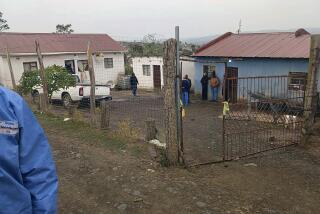13 Blacks Killed, 200 Hurt in 2 Days of S. Africa Riots
- Share via
JOHANNESBURG, South Africa — Seven more blacks were killed Tuesday in a second day of running battles with South African police at the Crossroads squatter settlement outside Cape Town.
The deaths brought the official toll there to 13 dead and more than 200 people injured.
Meanwhile, the government charged six prominent anti-apartheid activists with high treason and detained seven others for interrogation in a new crackdown on opposition groups.
The fiercest clashes at Crossroads occurred in late afternoon as several thousand rioters, hurling stones and bottles of flaming gasoline, advanced on government offices and electric power transmission facilities near the settlement, protecting themselves with makeshift shields of corrugated steel taken from the shantytown’s shacks.
The police, reinforced by heavily armed paramilitary units, fired volleys of tear-gas grenades, rubber bullets and birdshot to turn back the rioters. Later, automatic rifle fire was heard from around the settlement, according to residents reached by telephone, and more casualties were feared.
By nightfall, however, the fighting had subsided and an uneasy truce prevailed. Crossroads leaders were working with local government officials to restore calm, and the police promised to withdraw from the immediate vicinity in return for a community pledge to clear barricaded roads and halt the attacks on administration offices.
The treason arrests did not appear to be directly connected to the unrest near Cape Town. The six accused include three top officials of the United Democratic Front, a coalition of 645 groups opposed to apartheid, two union organizers and an Asian community leader.
Arrested in pre-dawn raids by security police on more than 25 offices and residences across the country, the six will be tried with eight other anti-apartheid activists, all affiliated with the multiracial United Democratic Front, who were charged with treason in December. A preliminary hearing in the case is scheduled for March 29, but the trial is not expected to start until June.
Those charged with treason are Albertina Sisulu, a United Democratic Front regional president and the wife of a jailed leader of the outlawed African National Congress; the Rev. Frank Chikane, a regional vice president of the front; Cassim Saloojee, the front’s treasurer; trade union organizers Sam Kikine and Isaac Ngcobo, and Prof. Ismail Mohammed, an Asian community leader.
The police also arrested at least seven people under security laws that permit indefinite detention in solitary confinement for interrogation. Those held include a South African Council of Churches community organizer, a prominent woman activist and two workers on a rural community newspaper.
The immediate impact of the arrests was to diminish what modest hopes had been engendered by recent government promises of political reforms giving blacks a voice in decision-making and the planning of the country’s future.
The focus of the Crossroads dispute in Cape Town is the fear of the shantytown’s 65,000 residents that they will be forcibly moved to a new settlement being constructed for blacks farther from Cape Town, and that some will be taken back to the rural tribal homelands they left in order to find work in the metropolitan area.
Unless the government gives firm and credible guarantees that Crossroads residents will not be forcibly resettled, the situation could quickly “approach civil war,” Cape Town’s Anglican Archbishop Philip Russell warned Tuesday night.
Timo Bezuidenhoud, Cape Town’s chief commissioner for cooperation and development, who oversees black affairs in the area, again declared on the government’s behalf that there are no plans for forcing the Crossroads community to move and that all resettlement plans will be discussed fully in advance.
“Please, please, believe me,” Bezuidenhoud pleaded at a meeting with community leaders Tuesday afternoon. “These deaths are a terrible tragedy. The fighting must be ended.”
The actual death toll at Crossroads may be much higher than the six officially reported killed Monday and the seven Tuesday.
Medical workers said they had been told that 14 bodies were found around the settlement early Tuesday from the heavy fighting on Monday. A doctor said two people died Tuesday in his clinic in Crossroads and more in nearby hospitals. Newspaper photographers and television cameramen filmed seven bodies being stacked in a police armored car. None of these seemed to be included in the statistics provided Tuesday night by police.
The unrest at Crossroads is the worst that South Africa has experienced in three months, and it has raised fears that the country may face new racial violence that would make even modest reforms virtually impossible.
“Unless we get the lid on quickly, the right wing will say, ‘We told you so,’ and that will mean the end of any dialogue with the blacks over anything,” an official of the ruling National Party commented.
More to Read
Sign up for Essential California
The most important California stories and recommendations in your inbox every morning.
You may occasionally receive promotional content from the Los Angeles Times.













